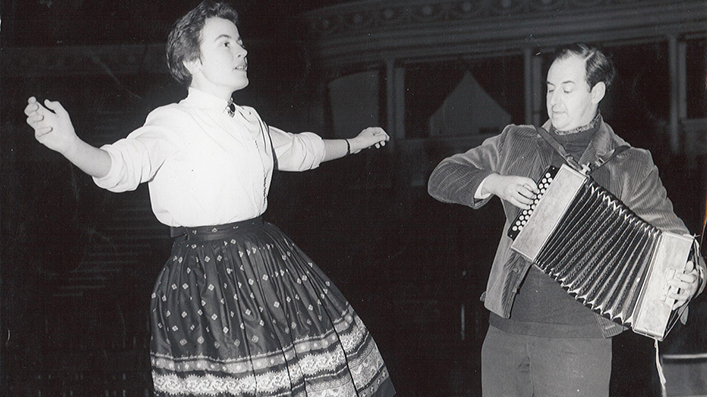Stepping On: a meeting of minds and feet
English Dance and Song Spring 2020
This article was published in English Dance and Song, the magazine of the English Folk Dance and Song Society. The world’s oldest magazine for folk music and dance, EDS was first published in 1936 and is essential reading for anyone with a passion for folk arts.
In November 2019, the Vaughan Williams Memorial Library hosted a conference on step dancing in its many and varied forms. It was held in collaboration with the Instep Research Team, the Historical Dance Society and the University of Roehampton, and chiefly organised by Toby Bennett. Julie Williams, clog and step dancer and a member of Instep, gives her account of the event.
Stepping On proved to be the most wonderful weekend, offering the chance for step dancers to gather together. This collaborative conference was a first in terms of presenting step dance within an academic context. Judging by the papers and presentations, it was more than overdue, with many interesting topics and highly accomplished dance demonstrations.
The first day started with a presentation from community clog dancer and researcher Alex Fisher on the roots of Lancashire Street Clog Dance. This was followed by a discussion on Ontario old-time step dance by Dr Sherry Johnson, an ethnomusicologist from Canada. Sherry, like Alex, was searching for common roots for her steps.
Next were two fascinating presentations by Sean Goddard, currently studying for an MA in the History of English Country Dancing, and Chloe Middleton-Metcalfe, completing her doctorate on English Social Folk Dance Identities and Repertoires. Sean considered tempos specified for social dancing and the influence exerted by EFDSS on them. Chloe discussed hornpipe stepping at barn dances. She argued that this was part of the re-Anglicisation of English social dance in the 1970s, when ceilidh bands deliberately slowed down tempos so that more footwork and stepping could be put back into the dances, with a simple hornpipe step being most common.
Following this, Dr Anne Day of the Historical Dance Society considered the meanings of ‘footing’ and to ‘foot it’, and whether they just described dancing in place (vernacular) or referred to specific steps. Based on her extensive research, she concluded that vernacular steps do indeed exist in social dancing.
Siobhan Butler, a performer and teacher, discussed the influence in the 1970s-90s of the award-winning Mullagh Set Dancers from County Clare. Their heavy, percussive style of dancing known as ‘battering’ has now become an accepted element of solo and ‘sean-nos’ dance practices. In a different context, but with a similar focus on Irish dance styles, Annabelle Bungay, an American step dancer, considered the influence of American consumerism and conformity on the changing face of Irish step dance competitions.
Solo Welsh stepping champion Huw Williams entertained the audience with a journey through the Welsh step dancing tradition, which was almost wiped out in the 18th and 19th centuries, only kept alive by the Gypsy communities. Members of Camden Clog were up next with an interesting discussion around how the steps of the Tracey family evolved from an individualist set of steps and came to be ‘taught outside that context and to translate to the newer team approach of clog dancing’.
The evening was hosted by the wonderful Kerry Fletcher, while the Brown Boots Band and Will Chamberlain proved to be highly adaptable for the number of different guest callers and dances. All dances were stepped, of course, and we were also treated to several wonderful dance spots. The next day delivered more treats, starting with a virtual presentation from Dr Heather Blasdale-Clarke from Queensland University. She gave us a fascinating talk on how white colonisation took step dancing to the colonies. In particular, it seems many 19th century settlers brought with them the craze for clog dancing. To my mind, the most outstanding paper and performance was teacher, performer and choreographer Simon Harmer’s Whistling Billy’s Barefoot Hornpipe. His mesmerising contemporary interpretation of the old sailor’s hornpipe steps was absolutely stunning, so carefully researched and choreographed.
Dr Mats Melin, ethnochoreologist at the University of Limerick, spoke about the Scotch reel as a solo dance. He made comparisons with Scottish and Irish solo dances and considered that the structure of eight bars reel followed by eight bars percussive stepping points to the notion of the Scotch reel being originally a solo dance.
In a similar but converse vein, Dr Heather Sparling, an ethnomusicologist at the University of Cape Breton, considered the Scotch fours dances in Cape Breton. Over the years, it seems that the form changed from a social participatory dance to a solo performance.
Dr Pat Ballantyne, of the University of Aberdeen, explored possible links between 18th century Scottish dance steps, as notated by a dancing master, and the present-day Cape Breton percussive dance style. Pat also reflected on the frustrations of trying to interpret historical dance sources.
Samantha Jones, dancer and ethnomusicologist from Boston, Massachusetts, explored ways in which dance steps are transmitted, specifically in Irish dancing, but applicable to many other forms. She discussed how beating out rhythms with hands and dance rhymes help to embed and embody dance steps.
The last paper, from Lisa Sture, was on the historical practice of Dartmoor stepping. Like other speakers, she discussed how social dance context has changed over time, from a popular pastime danced in many social settings, to a competition-style ‘set piece’ dance.
The weekend concluded with a discussion panel on English and Cornish Step Dance: Revival and Continuity, exploring the recent revival in interest of English and Cornish step dancing. The panel included Carmen Hunt, Janet Keet-Black, Jo Harmer, Katie Howson, Kerry Fletcher, Les Bennett and Toby Bennett, all prominent step dancers and/or musicians. With this discussion, as with all the papers presented, there was a sense of the ebb and flow throughout time, with dance styles changing, reforming, being redefined, crossing continents and cultures and being reinterpreted within different social contexts.





